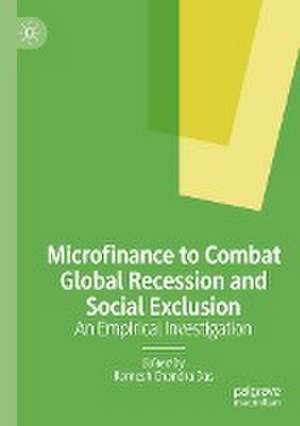Microfinance to Combat Global Recession and Social Exclusion: An Empirical Investigation
Editat de Ramesh Chandra Dasen Limba Engleză Paperback – 21 iul 2023
| Toate formatele și edițiile | Preț | Express |
|---|---|---|
| Paperback (1) | 998.19 lei 6-8 săpt. | |
| Springer Nature Singapore – 21 iul 2023 | 998.19 lei 6-8 săpt. | |
| Hardback (1) | 1003.38 lei 6-8 săpt. | |
| Springer Nature Singapore – 20 iul 2022 | 1003.38 lei 6-8 săpt. |
Preț: 998.19 lei
Preț vechi: 1217.31 lei
-18% Nou
Puncte Express: 1497
Preț estimativ în valută:
191.01€ • 204.25$ • 159.26£
191.01€ • 204.25$ • 159.26£
Carte tipărită la comandă
Livrare economică 17 aprilie-01 mai
Preluare comenzi: 021 569.72.76
Specificații
ISBN-13: 9789811911286
ISBN-10: 9811911282
Ilustrații: XXXI, 299 p. 8 illus., 4 illus. in color.
Dimensiuni: 148 x 210 mm
Greutate: 0.4 kg
Ediția:1st ed. 2022
Editura: Springer Nature Singapore
Colecția Palgrave Macmillan
Locul publicării:Singapore, Singapore
ISBN-10: 9811911282
Ilustrații: XXXI, 299 p. 8 illus., 4 illus. in color.
Dimensiuni: 148 x 210 mm
Greutate: 0.4 kg
Ediția:1st ed. 2022
Editura: Springer Nature Singapore
Colecția Palgrave Macmillan
Locul publicării:Singapore, Singapore
Cuprins
Chapter 1: Global Recession and Microfinance Institutions: Challenges and Opportunities.- Chapter 2: Are microfinance institutions unscathed from the recession? – An empirical reconsideration.- Chapter 3: Microfinance as a Strategy to Curb the Global Recession.- Chapter 4: Developing Strategies to Improve Microfinance System in Turkey with Fuzzy Logic.- Chapter 5: Efficiency of MFIs and financial inclusion in West Bengal: A DEA Approach.- Chapter 6: The Road So Far to Micro Insurance: The Financial Revolution in the Services for The Poor.- Chapter 7: Concentration of Financial Resources: Evidence from Indian Unorganised Manufacturing Enterprises.- Chapter 8: Financial Inclusion through Microfinance: Is it Possible?.- Chapter 9: Microfinance, Financial Inclusion and Income Inequalities: Are there Co-movements?.- Chapter 10: Political Economy of microfinance from the gender and politics point of view: As a way for enhancing social inclusion of women to the workforce.- Chapter 11: Assessing the Impact of Microfinance on Poverty and Inequality: A Study of 5 SAARC Nations using Causality Analysis.- Chapter 12: Sustainability of Indian Microfinance Institutions after Andhra Crisis: Evidences of Financial vis-à-vis Social Performance.- Chapter 13: Role of Microfinance Institutions in Social Inclusion – A Study with Reference to India.- Chapter 14: Role of Microfinance in reduction of Poverty in India.- Chapter 15: Predicting the Likelihood of Loan Default Among Marginalized Population: A Case Study on Rural Bengal.- Chapter 16: Effects of Financial widening Activities on Self-employment Opportunities in Nigeria: Implication on Global recession and Social Exclusion.- Chapter 17: Accessing Microfinance Potentiality – Combating Global Recession through Local Intervention.- Chapter 18: Assessing the Spatial-temporal Accessibility of Micro-finance in the Greater Accra Region of Ghana: A Geographical Information System Analysis.- Chapter 19: Microfinance in South Asia and SocialInclusion.- Chapter 20: Financial education vs university programs.
Notă biografică
Ramesh Chandra Das is currently Professor of Economics at Vidyasagar University, West Bengal, India. He has contributed several research papers to national and international journals with high impacts along with completions of three minor research projects sponsored by the University Grants Commission, India.
Textul de pe ultima copertă
The book focuses on how microfinance institutions can be the alternative way to supply funds to combat different phases of global economic recessions. Also, it emphasizes upon their capabilities in reducing poverty and inequality as the countries of the world today aim to attain the goal of sustainable development. The book further deals with the challenges that the micro financial institutions may face while sustain in the competitive and vast changing global business environment. Finally, the book analyses the effectiveness of micro financial services for the emergence of micro, small and medium enterprises with new technology and innovations which, in turn, can be instrumental in ensuring new relocation of global supply chains.
Ramesh Chandra Das is currently Professor of Economics at Vidyasagar University, West Bengal, India. He has contributed several research papers to national and international journals with high impacts along with completions ofthree minor research projects sponsored by the University Grants Commission, India.
Caracteristici
Addresses the role of microfinancial activity in a new shape Captures the role of microfinance in mitigating global recession Revisits the potentiality of microfinance in different perspectives
